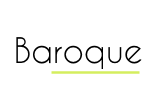 Bourgeois
Lady, 1690. The woman is bedecked in laces, exaggerating
the fashion of the day, to try to imitate the nobility. French Bourgeois
Lady, 1690. The woman is bedecked in laces, exaggerating
the fashion of the day, to try to imitate the nobility. French |
 Riding
Habit, 1690. Riding
Habit, 1690. |
 Lady,
1690. French Lady,
1690. French |
 Lady,
1693. French Lady,
1693. French |
 Lady,
1693. French Lady,
1693. French |
 Gentleman,
1695. French Gentleman,
1695. French |
 Musician,
1695. French Musician,
1695. French |
 Beauvilliers. French Beauvilliers. French |
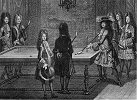 Louis
XIV playing Billiards, 1694. Chamillard is seen from the
back. He was a master in playing billiards and flattered the
King's passion for this game, for which he was made a Minister
in due course... French Louis
XIV playing Billiards, 1694. Chamillard is seen from the
back. He was a master in playing billiards and flattered the
King's passion for this game, for which he was made a Minister
in due course... French |
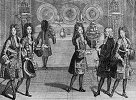 Gentlemen
of the Chamber at Court, 1694. Note the displayed plates
in the back, as well as the coffee-pots on the table. French Gentlemen
of the Chamber at Court, 1694. Note the displayed plates
in the back, as well as the coffee-pots on the table. French |
 Louis
XIV at the Age of 61, 1699. Note the very wide pagoda
sleeves, and it is clearly seen that the waistcoat is unbuttoned
5-6 buttons at the bottom. Often the buttonholes at the bottom
hem of the waistcoat were false. French Louis
XIV at the Age of 61, 1699. Note the very wide pagoda
sleeves, and it is clearly seen that the waistcoat is unbuttoned
5-6 buttons at the bottom. Often the buttonholes at the bottom
hem of the waistcoat were false. French |
 Toilette. French Toilette. French |
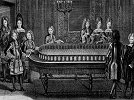 Court
at Gambling, 1694. The two children at the left are the
Ducs du Berry and Anjou, grandsons of Louis XIV. Note the
man on the right, who is seen from the back, and the arrangement
of the braid on the back seam of the coat. French Court
at Gambling, 1694. The two children at the left are the
Ducs du Berry and Anjou, grandsons of Louis XIV. Note the
man on the right, who is seen from the back, and the arrangement
of the braid on the back seam of the coat. French |
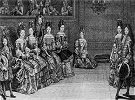 Court
Dancing, 1694. On the right is the Duc de Bourgogne and
on the left the oldest grandson of Louis XIV, who wears the
fashionable patches in his face, just like the ladies. French Court
Dancing, 1694. On the right is the Duc de Bourgogne and
on the left the oldest grandson of Louis XIV, who wears the
fashionable patches in his face, just like the ladies. French |
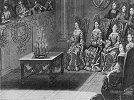 Court
gathered for a Concert, 1694. Note the small muffs the
ladies are using to warm their hands. They are all wearing la grande robe, the court dresses, and not mantuas. French Court
gathered for a Concert, 1694. Note the small muffs the
ladies are using to warm their hands. They are all wearing la grande robe, the court dresses, and not mantuas. French |
 Gentleman
in Winter Fashion, 1692. French Gentleman
in Winter Fashion, 1692. French |
 Noble
Lady and Gentleman, 1693. French Noble
Lady and Gentleman, 1693. French |
 Duchesse
Roquelaire, 1695. French Duchesse
Roquelaire, 1695. French |
 Duc
du Maine, 1695. Note he is wearing a shorter version of
the periwig, and only the outermost buttons of the pocket
flaps are buttoned. French Duc
du Maine, 1695. Note he is wearing a shorter version of
the periwig, and only the outermost buttons of the pocket
flaps are buttoned. French |
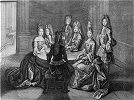 Court
playing Cards, 1694. The third person from the right,
seated, with a blond periwig, is the Grand Dauphin, the son
Louis XIV's, who died before his father. French Court
playing Cards, 1694. The third person from the right,
seated, with a blond periwig, is the Grand Dauphin, the son
Louis XIV's, who died before his father. French |
 Aristocratic
Couple, 1693. Bonnart. French Aristocratic
Couple, 1693. Bonnart. French |
 Conty,
1694. Note the periwig, parted in the middle and towered at
the sides. Cravat worn as steinkerk/steenkerk. The hat brim
is turned up more now, developing into the early tricorne
hat. Plain broad silk band worn as bandelier over the waistcoat
and underneath the coat. Tasselled ribbon on the cane and
on the smallsword. French Conty,
1694. Note the periwig, parted in the middle and towered at
the sides. Cravat worn as steinkerk/steenkerk. The hat brim
is turned up more now, developing into the early tricorne
hat. Plain broad silk band worn as bandelier over the waistcoat
and underneath the coat. Tasselled ribbon on the cane and
on the smallsword. French |
 Gentleman
snuffing, 1694. Note the large plume called panache or garniture worn from the middle of the hat along
the brim towards the right back. Cravat worn à la
Chaconne, the revers of the justaucorps is, very unusual,
turned back and all the way down the front buttoned back,
stockings embroidered at the ankles. French Gentleman
snuffing, 1694. Note the large plume called panache or garniture worn from the middle of the hat along
the brim towards the right back. Cravat worn à la
Chaconne, the revers of the justaucorps is, very unusual,
turned back and all the way down the front buttoned back,
stockings embroidered at the ankles. French |
 French
Lady, 1695. Note the ribbon bows she is wearing amongst
the lace rows of the Fontange. Jewels in her hair and hairpins.
The stomacher pièce d'estomac is embroidered,
engageants at the chemise sleeves with ribbons at the height
of the elbow. French French
Lady, 1695. Note the ribbon bows she is wearing amongst
the lace rows of the Fontange. Jewels in her hair and hairpins.
The stomacher pièce d'estomac is embroidered,
engageants at the chemise sleeves with ribbons at the height
of the elbow. French |
 French
Lady, 1693. Note her Fontange with a double lace row,
and each row extends to lappets falling down her back. Tassels
at decoration on the jupe and the cuffs. French French
Lady, 1693. Note her Fontange with a double lace row,
and each row extends to lappets falling down her back. Tassels
at decoration on the jupe and the cuffs. French |
 Man,
1693. Bonnart. French Man,
1693. Bonnart. French |
 Gentleman
in Dressinggown, 1695. Gentleman
in Dressinggown, 1695. |
 Gentleman
in Winter Fashion, 1690. Note the long locks of the periwig
being worn à la catogan in a loose knot, the
hat is not a tricorne hat yet, large plume in the curved up
brim of the hat. Large cape, which was mostly worn only for
travelling, justaucorps à la Brandenbourg with two
vertical pockets. French Gentleman
in Winter Fashion, 1690. Note the long locks of the periwig
being worn à la catogan in a loose knot, the
hat is not a tricorne hat yet, large plume in the curved up
brim of the hat. Large cape, which was mostly worn only for
travelling, justaucorps à la Brandenbourg with two
vertical pockets. French |
 Comtesse
Mailly, 1698. French Comtesse
Mailly, 1698. French |
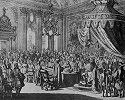 Revocation
of the Edict of Nantes. It took place in 1685, but this
engraving is surely from the 1690s, judging the costumes.
Note the flat back of the periwigs the two gentlemen wear
on the left corner. The Revocation was an unforgivable act
by Louis, and led to the exile of thousands of Huguenots,
especially craftsmen and middle class, bleeding French economy
further. By Jan Luiken. French Revocation
of the Edict of Nantes. It took place in 1685, but this
engraving is surely from the 1690s, judging the costumes.
Note the flat back of the periwigs the two gentlemen wear
on the left corner. The Revocation was an unforgivable act
by Louis, and led to the exile of thousands of Huguenots,
especially craftsmen and middle class, bleeding French economy
further. By Jan Luiken. French |
 Louis
XIV at the Siege of Mons, 8th April 1691. Mons was captured
during the War of the League of Augsburg. Louis is shown with
his brother Philippe (left foreground), the Duc de Bourbon
and the Duc de Chartres. Note the back views of the justaucorps
of the two gentlemen in the right corner. French Louis
XIV at the Siege of Mons, 8th April 1691. Mons was captured
during the War of the League of Augsburg. Louis is shown with
his brother Philippe (left foreground), the Duc de Bourbon
and the Duc de Chartres. Note the back views of the justaucorps
of the two gentlemen in the right corner. French |
 Jean
Bart (1651-1702), 1690s. The famous French Corsair came
from Dunkirk. Note the long and thin pipe, and the justaucorps
only buttoned at the waist with three buttons. French Jean
Bart (1651-1702), 1690s. The famous French Corsair came
from Dunkirk. Note the long and thin pipe, and the justaucorps
only buttoned at the waist with three buttons. French |
 William
III, 1690's. A blue Delftware tile portrait of William,
after Daniel Marot. English William
III, 1690's. A blue Delftware tile portrait of William,
after Daniel Marot. English |




